“An investment in knowledge pays the best interest.”
Benjamin Franklin
I really wish I had been taught personal finance in school; my life would be much different now. I believe this is a skill that everyone should learn, at least by high school, so we are better equipped to face life. But it’s never too late; you can still learn a lot about personal finance no matter where you are in your journey. The key is to read the right book for you. In this post, we have discovered 7 must-read books about personal finance that can help you manage your wealth or even create it in the first place. Anyone with the right skills can amass a significant amount of cash, if done properly.
So make sure to read the full list as each book has its own superpower in the world of personal finance.
1. The Algebra of Wealth by Scott Galloway
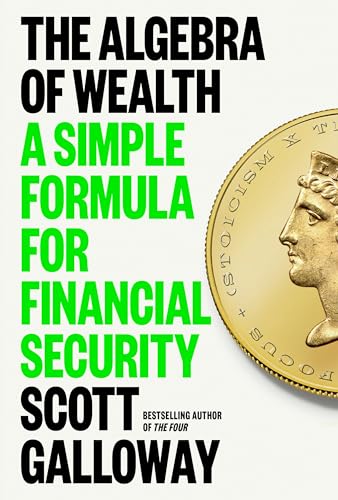
“The Algebra of Wealth: A Simple Formula for Financial Security” by Scott Galloway is a comprehensive guide to understanding and achieving financial success in today’s dynamic economy.
The book is written in Galloway’s characteristic unvarnished, no-nonsense style. It lays out the rules of financial success in the modern world and provides practical advice on how to improve your chances of achieving economic security.
The book emphasizes the importance of finding and following your talent, not just your passion, when making career decisions. It also explains how to ride and optimize big economic waves, as market dynamics often have a greater impact on financial success than individual achievements.
Galloway also provides practical advice on small steps that can lead to big returns later on, such as diversification and tax planning. He also discusses the role of stoicism in minimizing spending and developing better financial habits.
Overall, “The Algebra of Wealth” offers a powerful framework for making the most of the opportunities that come your way and optimizing your life for wealth and success. It’s a must-read for anyone interested in improving their financial situation and understanding the dynamics of wealth creation in the modern world.
2. I Will Teach You To Be Rich by Ramit Sethi
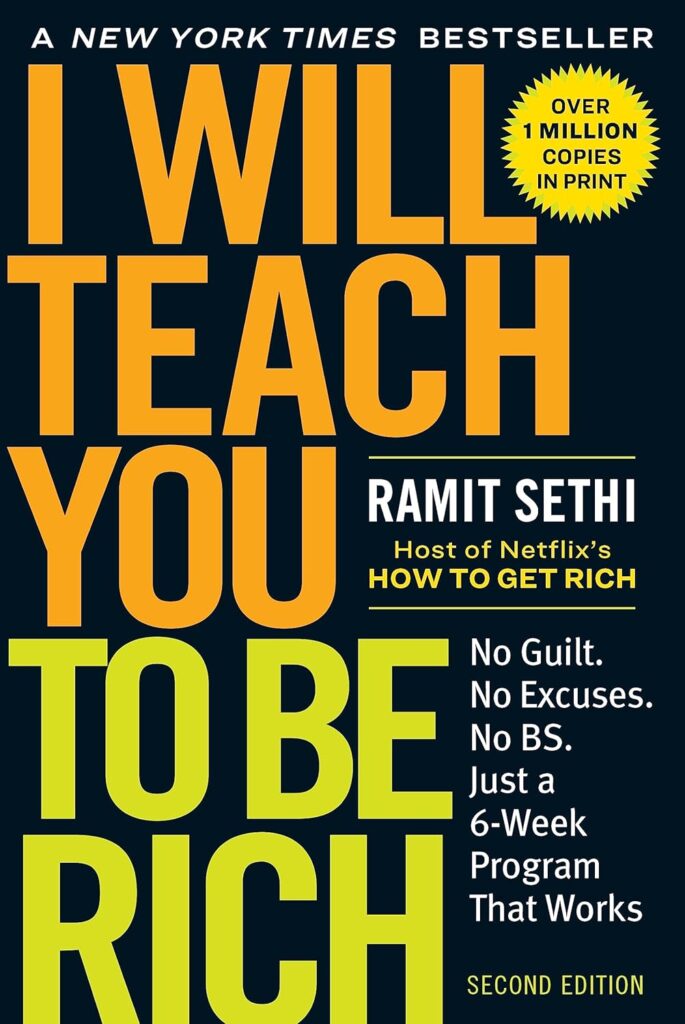
“I Will Teach You To Be Rich” by Ramit Sethi is a practical and insightful guide to personal finance and wealth management. It’s designed to help readers take control of their financial futures and live their version of a “rich life”.
The book is structured around a six-week plan, each week focusing on a different aspect of personal finance. The plan starts with the basics, such as understanding your income and expenses, and gradually moves into more complex topics like investing and wealth building.
One of the key messages of the book is that you don’t need to be a financial expert to get rich. Instead, Sethi emphasizes the importance of getting started early, making regular investments, and letting compound interest do the work.
Sethi also introduces the concept of “conscious spending”, which is about spending extravagantly on the things you love, but cutting costs mercilessly on the things you don’t. This approach allows you to enjoy your money now, while also ensuring you’re saving for the future.
Another important theme in the book is the idea of playing offense, not defense, with your money. This means focusing on increasing your earning potential, rather than just trying to cut costs.
Overall, “I Will Teach You To Be Rich” offers a fresh and accessible approach to personal finance, with practical advice and actionable steps that readers can start implementing immediately to improve their financial health and build wealth. It’s a must-read for anyone who wants to take control of their financial future and live their version of a “rich life”.
3. Finance for the People by Paco de Leon
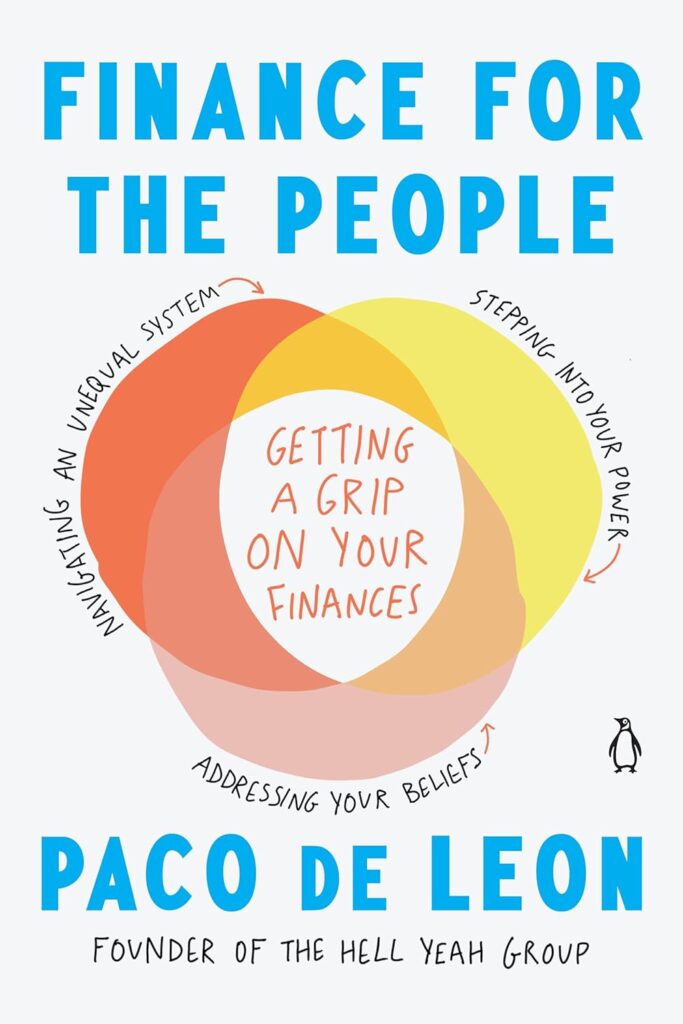
“Finance for the People” by Paco de Leon is a comprehensive guide that aims to demystify personal finance and empower individuals to take control of their financial lives. The book takes a fresh approach to finance, making it accessible and relatable to readers from all walks of life.
Here are five key points from the book:
Financial Empowerment for Everyone
The book emphasizes the importance of financial literacy and empowerment for individuals, regardless of their income or background. Paco de Leon breaks down complex financial concepts into simple, relatable terms, enabling readers to develop a solid foundation of financial knowledge.
Mindset Shift: From Scarcity to Abundance
The book challenges the traditional scarcity mindset that often prevails in discussions around finance and money. Paco de Leon encourages readers to shift their mindset from scarcity to abundance, fostering a positive and proactive approach to financial well-being.
Building a Healthy Financial Foundation
The author emphasizes the significance of building a strong financial foundation by addressing essential topics such as budgeting, saving, and debt management. Paco de Leon provides practical advice and strategies to help readers develop healthy financial habits and achieve their financial goals.
Investing and Wealth Creation
The book explores the world of investing and wealth creation, making it approachable for readers with little to no prior knowledge in these areas. The book delves into various investment options, risk management, and long-term wealth-building strategies, empowering readers to make informed decisions about their financial future.
Navigating the Complexities of Financial Systems
Paco de Leon acknowledges the complexities of financial systems and institutions, which can often feel overwhelming and intimidating. The book equips readers with the knowledge and tools necessary to navigate these systems, including banking, credit, taxes, and insurance, enabling them to make confident financial choices.
Overall, “Finance for the People” provides a refreshing and inclusive approach to personal finance. Paco de Leon’s conversational writing style, relatable anecdotes, and actionable advice make this book an invaluable resource for individuals seeking to improve their financial well-being. By demystifying finance and offering practical guidance, the author empowers readers to take control of their financial lives and create a more secure and prosperous future. If you’re eager to dive deeper into the valuable insights and practical advice shared in “Finance for the People” by Paco de Leon, I highly recommend giving it a read.
4. The Automatic Millionaire by David Bach
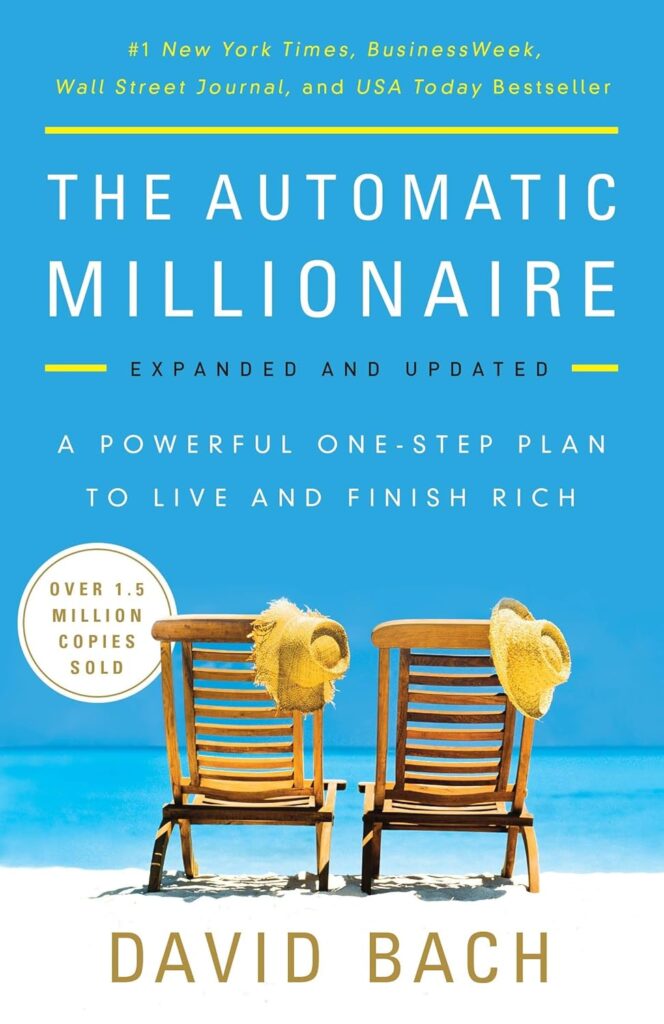
“The Automatic Millionaire” by David Bach is a practical guide that provides a simple but powerful action plan for automating your finances, building your wealth, and achieving financial freedom.
The book is based on the premise that financial freedom doesn’t come from how much you earn, but how you manage your earnings. It introduces the concept of an “automatic system”, which is a strategic use of automation to manage your finances. This system is designed to help you make smart financial decisions, automate your finances, and build your wealth using only a few dollars a day.
Key principles introduced in the book include:
Paying oneself first
This principle emphasizes the importance of setting aside a portion of your income for savings before spending on anything else.
Living within means
The book encourages readers to spend less than they earn, thereby avoiding debt and increasing savings.
Home ownership
Bach argues that owning a home is a key step towards building wealth.
Optimizing retirement contributions and automating debt reduction
The book provides strategies for maximizing contributions to retirement accounts and reducing debt in an automated manner.
Making informed investment choices
The book guides readers on how to make wise investment decisions.
One of the unique aspects of the book is the concept of “The Latte Factor”. This refers to the idea that small, everyday expenses (like buying a latte) can add up over time, and by cutting these out and investing the money instead, one can build significant wealth.
In summary, “The Automatic Millionaire” offers a practical and accessible roadmap to financial independence. It’s a valuable resource for anyone looking to take control of their financial future and achieve their dream of becoming a millionaire.
5. The Simple Path to Wealth by JL Collins
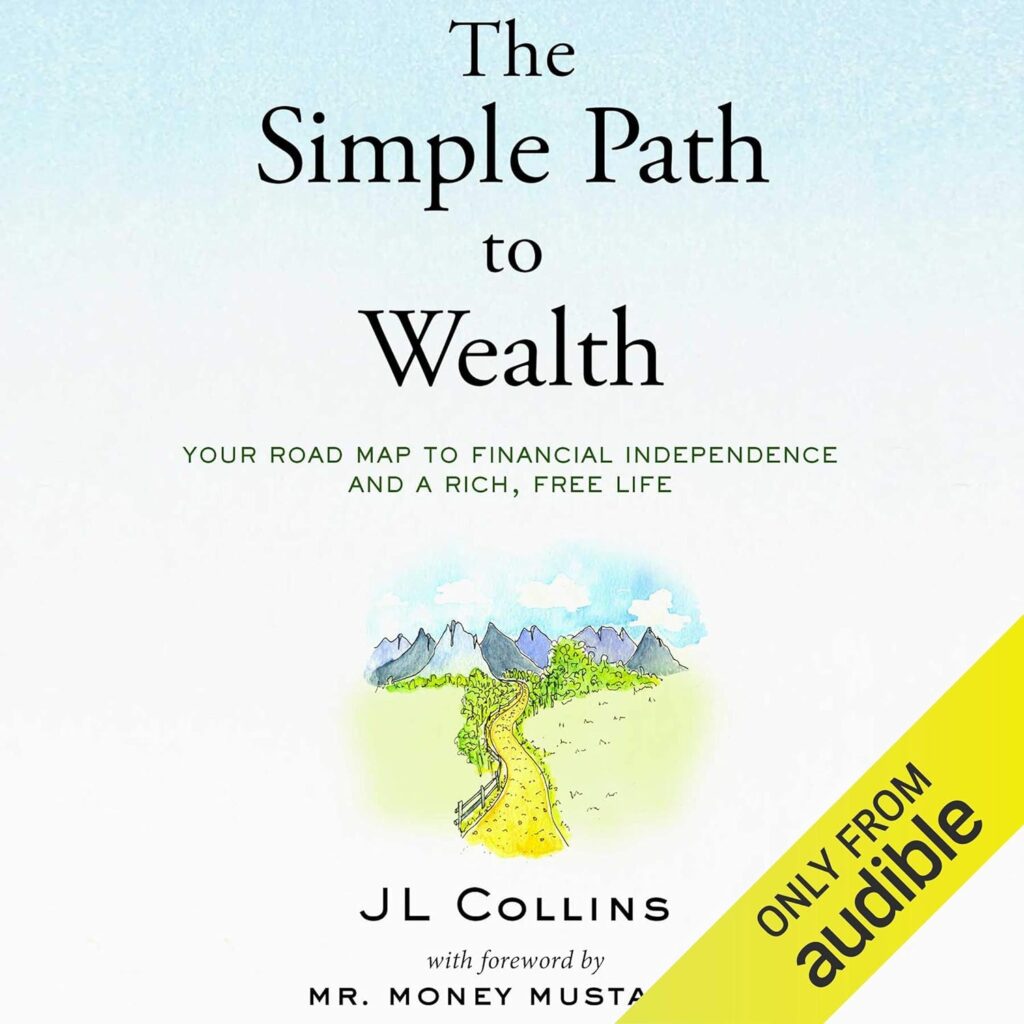
“The Simple Path to Wealth” by JL Collins is a comprehensive guide to achieving financial independence and wealth. The book simplifies complex financial concepts and provides a roadmap to financial freedom through saving, investing, and avoiding debt.
Here are the key points from the book:
Importance of Financial Independence
Collins emphasizes the importance of financial independence as a primary goal. He advocates for a lifestyle that prioritizes saving and investing over high consumption. The book begins by establishing the foundational mindset necessary for wealth accumulation, stressing the freedom and choices that financial independence affords.
Power of Index Funds
A significant portion of the book is dedicated to explaining why low-cost index funds, particularly those tracking the stock market as a whole, are the most effective tools for most investors. Collins critiques more complex and actively managed investment strategies, arguing that they often lead to higher fees and lower returns.
Debt and Wealth Accumulation
Collins provides a comprehensive look at how debt impacts wealth building. He makes a strong case against incurring high-interest debt, such as credit card debt, and outlines strategies for paying off debt.
Frugality and Expense Management
A key theme throughout the book is the role of frugality and managing expenses in wealth accumulation. Collins argues that controlling spending is more crucial than earning a high income. He advocates for living below one’s means and investing the surplus.
Wealth Preservation and Withdrawal Strategies
The book offers practical advice on budgeting, cutting unnecessary expenses, and prioritizing spending in a way that aligns with personal values and long-term financial goals.
In summary, “The Simple Path to Wealth” offers a straightforward approach to achieving financial independence through saving, investing in low-cost index funds, and avoiding debt. It emphasizes the power of compounding, frugality, and long-term investment strategies to build wealth steadily and securely.
6. Get Good With Money by Tiffany “The Budgetnista” Aliche
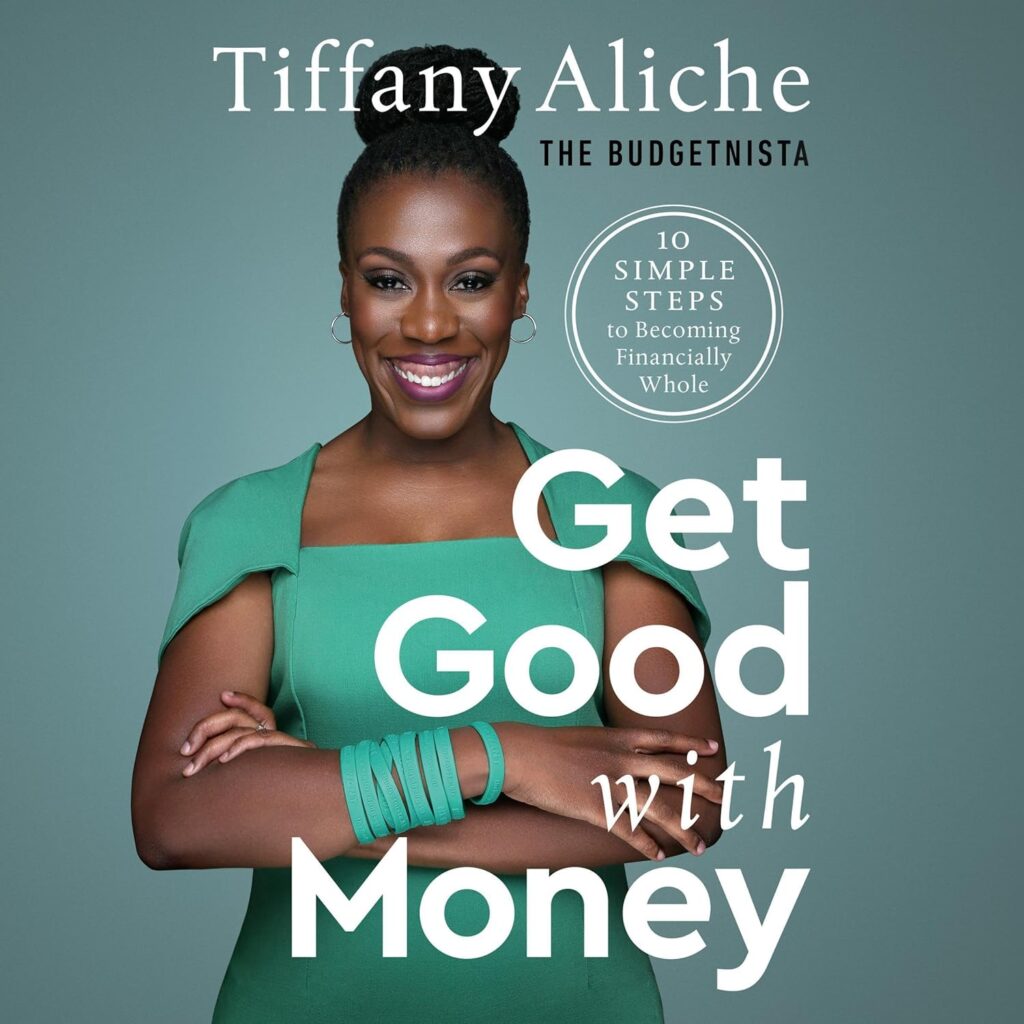
“Get Good With Money” by Tiffany “The Budgetnista” Aliche is a practical guide to achieving financial wholeness, which she defines as a realistic, achievable, and energizing alternative to get-rich-quick and over-complicated money management systems.
The book outlines a ten-step formula for attaining both financial security and peace of mind. These principles have helped more than one million women worldwide save and pay off millions in debt, and begin planning for a richer life.
Key points from the book include:
Determining Your Baseline or “Noodle Budget”
Aliche provides a simple technique to examine and systemize your expenses, and lay out a plan that allows you to say yes to your dreams.
Understanding Your Financial Issues
The book includes an assessment tool that helps you understand whether you have a “don’t make enough” problem or a “spend too much” issue, as well as ways to fix both.
Saving for the Future
Aliche shares best practices for saving for a rainy day (aka job loss), a big-ticket item (a house, a trip, a car), and money that can be invested for your future.
Taking Charge of Your Finances
The book provides detailed advice and action steps for taking charge of your credit score, maximizing bill-paying automation, savings and investing, and calculating your life, disability, and property insurance needs.
Protecting Your Beneficiaries’ Future
Aliche discusses ways to protect your beneficiaries’ future, and ensure that your financial wishes will stand the test of time.
Overall, “Get Good With Money” is an invaluable guide to cultivating good financial habits and making your money work for you. It will help you build a solid foundation for your life (and legacy) that’s rich in every way.
7. Cashing Out: Win the Wealth Game by Walking Away by Julien and Kiersten Saunders

“Cashing Out: Win the Wealth Game by Walking Away” by Julien and Kiersten Saunders is a revolutionary guide to achieving financial freedom and building wealth on your own terms.
The book challenges the traditional script of working hard, making money, saving, and investing. It argues that financial freedom is within your reach, but playing by corporate America’s rules will only take you halfway there. To win, you must eventually walk away—and take up an entirely different model of wealth accumulation.
Key points from the book include:
Redefining Black Excellence
The authors critique the mantra and glitz of “Black Excellence” as an unsustainable motivation for wealth building.
Career Goals and Financial Freedom
The book provides guidance on how to prioritize the right goals at each stage of your career so you can quit in 15 years or less.
Money Conversations
It offers advice on how to talk about money with your loved ones without coming to blows.
Maximizing Income
The authors share practical strategies to bring more money in without robbing you of time and energy you don’t have.
Drawing from their journey of paying off $200,000 of debt in five years, quitting their high-stress corporate jobs, and retaking control of their finances, the authors provide a roadmap to financial freedom.
In summary, “Cashing Out” shows you how to break free from the traditional corporate structure that leaves you under-appreciated and underpaid, and open the door to a new kind of prosperity.
You Might Also Like:
- 8 Books to Skyrocket Your Productivity (With Short Summaries)
- 7 Banned Books You Shouldn’t Read and Here’s Why
- 5 Books That Will Teach You High-Income Skills in 2024
- 13 Pieces of Advice From Adam Grant, From His New Best Seller Book
- Book Summary: “The Creative Act” by Rick Rubin
- Book Summary of “The Story of B,” by Daniel Quinn